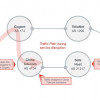Visa plans program to protect online by adding password protection
Sometimes, simple is better. After years of promoting high-tech anti-fraud measures like smart cards and neural networks, a decidedly low-tech feature is coming to credit cards that might go a long way toward protecting your private information.
Visa announced Monday it?s moving forward with plans to add old-fashioned password protection to credit card purchases made online. The question is: Are consumers worried enough about theft of their data that they?ll be willing to take the extra step?
IF VISA HAS its way, by Christmas, many online checkout procedures will be interrupted by a request for a bank-issued credit card password. No password, no purchase ? less fraud. That?s the idea, anyway.
The problem with most current online transactions is there?s no way for a merchant to know who?s behind the keyboard when a credit card number is typed into a Web page. In the real world, at least there?s a person, a piece of plastic and a signature that all attest to who?s spending the money. The system?s hardly perfect, but those passing glances by store clerks at receipt signatures cut down on rudimentary fraud schemes.
For years, financial institutions and credit card companies have promoted a variety of anti-fraud measures designed to simulate some of those real-world assurances in the online world ? software that would somehow prove that the consumer spending the money is the actual card holder.
For example, there are still plans to slowly upgrade the millions of credit cards around the world into ?smart cards.? Equipped with a tiny computer chip, these otherwise familiar-looking pieces of plastic have a certificate that must be read by a computer and verified before a purchase can be made. That means the account number and the plastic can?t be separated, and a stolen database of thousands of smart card numbers would be almost useless.
NOT READY FOR PRIME TIME
But currently, smart cards are relatively useless because virtually no consumers have smart card readers. The required infrastructure and consumer behavior challenges to a smart card system are enormous ? hence the past 10 years of press releases with few results.
Earlier this year, Visa U.S.A. announced a much simpler plan for limiting the usefulness of stolen credit card numbers. Dubbed ?Verified by Visa,? the program would allow consumers to add password protection to their credit card accounts.
?It?s a step in the right direction,? said e-commerce analyst Avivah Litan of Gartner Group. ?It?s the industry giving up on more sophisticated solutions because the market is consumer-driven and consumers don?t want do deal with complicated (security features).?
Consumers who implement the program would find they can?t spend money with their credit cards at a Web site until they enter a password. It?s akin to the signature consumers are accustomed to providing at real-world stores, or to the PIN that protects bank cards









































































